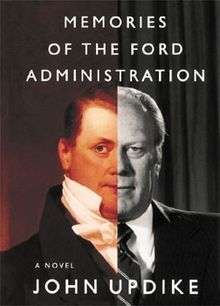Memories of the Ford Administration
Memories of the Ford Administration is a 1992 novel by John Updike published by Knopf.
 First edition cover | |
| Author | John Updike |
|---|---|
| Cover artist | Chip Kidd |
| Country | United States |
| Language | English |
| Genre | Philosophical, War |
| Publisher | Alfred A. Knopf |
Publication date | 1992 |
| Media type | Print (hardcover) and (audio-CD) |
| Pages | 369 pp |
| ISBN | 0-679-41681-1 |
| OCLC | 26055447 |
| 813/.54 20 | |
| LC Class | PS3571.P4 M45 1992b |
Plot
Alf Clayton is a struggling history professor at an obscure junior college in New Hampshire in the mid-Seventies. He's cheating on his wife with another faculty wife, and at the same time he's trying to write a book about President James Buchanan, the last President before Abraham Lincoln and the Civil War. Just as Buchanan was never able to figure out which side he was on, North or South, slavery or abolition, so Alf can't make up his mind between his warm, relaxed, slightly bohemian wife Norma ("The Queen of Disorder") and younger, sexier, more aristocratic Genevieve ("The Perfect Wife.") The book is actually Professor Clayton's response to a national survey requesting "memories and impressions" of the administration of Gerald Ford by the Northern New England Association of American Historians (NNEAAH).
Major themes
With venomous irony, Clayton describes the sexual license of the Ford years in salacious detail, alternating between his memories of the 1970s and scenes from his uncompleted biography of James Buchanan. Although Buchanan's life and times are discussed in great detail, to the point that Clayton (and Updike) crosses over into the realm of imagined thoughts and dialogue, there is next to nothing said about Ford or his administration in the novel. Rather, the Ford-era part of Clayton's memories centers almost entirely on the professor's personal life, above all his romantic involvement with the wife of an English teacher on campus. Sexual encounters are described in loving detail, leaving the reader to think that Clayton must be off his rails to be enumerating such dalliances before members of the NNEAAH. He is off his rails in another way, too, as he is unable to constrain himself in writing about Buchanan, someone generally thought to have been rather a dud as a person and a president. However, Clayton believes that Buchanan was largely wrongly blamed for bringing about the American Civil War by his weak leadership, and the historian questions how correct the general perception of Buchanan's character as related by most historians actually is.
The novel is a tour de force in the genre of mixed history and fiction or rather in the writerly craft of stretching historical description to (and beyond) its accepted limits. No one seems to know more about Buchanan than Clayton/Updike, and that apparently is one reason why Clayton could never finish his Buchanan biography: he simply could not imagine his subject in any but the most intimate of terms. Writing a standard biography would have been too objectifying an act. He needs the prompt of "memories and impressions" concerning another president to get him going.
Clayton also notes the way that sexual mores had changed during his lifetime, recalling that while in the 1970s, it was considered common for teachers at colleges to engage in sexual liaisons with their female students, but by the 1990s that was deemed to be totally unacceptable and even criminal behavior. He vaguely laments the loss although he is now back with his wife in the era of Ronald Reagan and George H. W. Bush, and he comes across as a chastened man.
External links
- ISBN 0-449-91211-6
- NYT Review